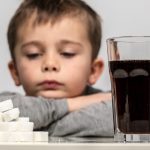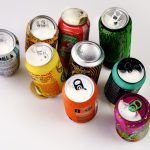Action on Sugar, the expert group based at Queen Mary University of London, along with 16 NGOs[i] are today calling for the Health Secretary, Steve Barclay, to release the much-awaited Commercial Baby Food and Drink Guidelines[ii] as data shows the main contributor of sugars in infants, aged four to nine months, is coming from shop brought baby foods – in particular fruit-based and cereal-based foods.[iii]
Introducing good nutrition early on is essential in developing a healthy relationship to, and preference for, healthy foods, and in supporting a baby’s future health.3 It is recommended infants (before the age of two) should avoid sugar sweetened drinks and food with added sugar[iv], and, after this, free sugars should provide no more than 5% of their daily energy intake (approximately 14g).3 However, shockingly, by the time children are 18 months, they are reportedly already consuming nearly 30g free sugars (7tsp) a day – the recommended maximum for an adult.[v],[vi]
Although many baby food brands are already reducing sugars, there are still products marketed as suitable for infants and young children with unsuitably high levels of sugars. As illustrated in Table 1, the range in total sugars levels in similar products can be a whopping 64g difference!
Table 1. Highest total sugars product vs lowest total sugars product found in the baby aisle per 100g, per category [vii]
| Food Category | Highest Total Sugars (g) per 100g | Lowest Total Sugars (g) per 100g | Difference (g) per 100g |
| Processed Fruit Snacks | 70.0 | 6.4 | 63.6 |
| Fruit Bar Snacks | 61.0 | 10.0 | 51.0 |
| Oat Bar Snacks | 30.0 | 18.2 | 11.8 |
| Hard Baked Snacks | 29.0 | 2.5 | 26.5 |
| Fruit Pouches | 19.5 | 6.3 | 13.2 |
| Prepared Baby Rice | 12.0 | 8.3 | 3.7 |
| Prepared Porridge | 9.2 | 2.8 | 6.4 |
| Puffed / Aerated Snacks | 8.7 | 1.0 | 7.7 |
| Rice Pudding | 8.6 | 5.2 | 3.4 |
| Vegetable Pouches | 8.2 | 0.5 | 7.7 |
To improve the nutritional content of shop brought baby foods, releasing the guidelines is therefore essential. The consequences of an unhealthy diet in early years has a life-long impact on a person’s diet and health, which is why the commercial baby food and drink industry should do more to encourage a healthy diet.
In a Censuswide survey[viii] of 1,000 UK parents with children aged six to 36 months old, 91% said they support the Government in taking action to ensure all food and drinks available in the baby aisle are nutritionally appropriate according to NHS recommendations.
Three leading baby food companies[ix] have also signed an open letter to the Health Minister to call for the release of commercial baby food and drink guidelines, in order to create a level-playing field.
Zoe Davies (ANutr), Nutritionist at Action on Sugar says:
“Without doubt, both parents and children need to be supported for better health and it’s imperative that the baby food industry plays its part. The impact that good nutrition in early life has on someone’s future diet and health cannot be understated, which is why baby food guidelines are needed to ensure all food and drink products marketed to babies are nutritionally appropriate.”
Dr Kawther Hashem, Campaign Lead at Action on Sugar and Research Fellow at Queen Mary University of London adds:
“An unhealthy diet high in saturated fat, salt and sugar and low in fruit and vegetables is the biggest cause of preventable ill health globally. Given this, all food and drink companies should act responsibly and commit to improving their products as part of Government and NHS guidance and provide peace of mind for parents when buying foods for their young children.”
References
For parents looking for advice and support for weaning / feeding their children visit: https://www.nhs.uk/start4life/weaning/ready-or-not/
[i] Open letter signed by:
- The Royal College of Paediatrics and Child Health
London Early Years Foundation
Early Years Alliance
Obesity Health Alliance
British Dental Association
Oral Health Foundation
World Cancer Research Fund
Food Foundation
British Society of Paediatric Dentistry
Blood Pressure UK
Diabetes UK
Early Start Group
Faculty of Public Health
Food Active
Association for the Study of Obesity
The Dental Wellness Trust
[ii] Public Health England/The Department of Health and Social Care released their report on ‘Food and Drinks Aimed at Infant and Young Children: Evidence and Opportunities for Action‘ in 2019, and following this ‘Draft Guideline Proposals: Improving the Nutritional content of Commercial Baby Food and Drinks‘ consultation in 2020, with an initial goal for them to be achieved by 2023. http://www.babymilkaction.org/wp-content/uploads/2020/11/DRAFT-PHE-proposals-for-2023-commercial-baby-food-and-drink-guidelines.pdf
[iii] Foods and drinks aimed at infants and young children: evidence and opportunities for action June 2019. https://assets.publishing.service.gov.uk/government/uploads/system/uploads/attachment_data/file/812204/Foods_and_drinks_aimed_at_infants_and_young_children_June_2019.pdf
[iv] Sugar: the facts. https://www.nhs.uk/live-well/eat-well/food-types/how-does-sugar-in-our-diet-affect-our-health/
[v] NDNS: results from years 9 to 11 (combined) – Data tables
Data Table – NDNS Y9_11_Descriptive statistics tables_Final-2
https://www.gov.uk/government/statistics/ndns-results-from-years-9-to-11-2016-to-2017-and-2018-to-2019
27.9g/day = 9.7%
29.9/9.7*100 = 287.6g
287.6*3.75 = 1078.5kcal
5% of 1079kcal = 53.95kcal
54/3.75 = 14.4g
[vi] Children start to consume more products outside of the baby aisle from around 12 – 16 months based on feedback from the baby food industry. However, being exposed to sweet foods from the beginning of weaning encourages a greater preference to sweeter foods and may cause fussy eating later on
[vii] Data taken from FoodSwitch database to demonstrate range in sugar content for similar foods.
Snacks, Pouches, Rice Pudding data from Nov 22 – March 23
Baby Rice, Porridge data from August 2022
[viii] The research was conducted by Censuswide with 1004 UK Parents of children ages 6-36 months between 02.11.2022 – 03.11.2022. Censuswide abide by and employ members of the Market Research Society which is based on the ESOMAR principles and are members of The British Polling Council.
[ix] Open letter signed by Babease, Little Dish and Little Freddie.











